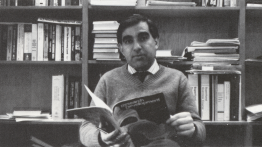In Memoriam: Professor Constantine Yapijakis
POSTED ON: October 3, 2024

Photo of Prof. Yapijakis from the 1987 Cable
Constantine Yapijakis, professor of environmental engineering in the Civil Engineering Department, recently passed away. Professor Yapijakis taught at The Cooper Union since September 1986.
Born and raised in Drama, Macedonia in northeastern Greece, he emigrated to the United States in 1971, after studying civil engineering at the National Technology University in Athens. The following year he won the Intern Engineer Award from the Institute of International Education. In 1973, he earned a Master of Science in civil/environmental engineering from New York University. In 1981 he was awarded a Ph.D. in civil/environmental engineering from Polytechnic University in Brooklyn, now part of NYU’s Tandon School of Engineering.
He was a professor at The Cooper Union until May, 2024, teaching undergraduate and graduate classes in environmental engineering. In 1986, Professor Yapijakis founded the school’s environmental engineering lab. His work in the field was recognized with a Fulbright Senior Scholar Award, which brought him back to Greece for the 1994–95 school year. His research earned him grants from the National Science Foundation in 1988 and 1992.
He worked extensively in industry, starting as a junior engineer for a construction firm in Athens and then the Public Works Department of Amsterdam. In 1991, he was a founding partner of Hellenic EnvironTech in Athens. He co-authored books with other professors for management of industrial and hazardous wastes (Handbook of Industrial and Hazardous Wastes Treatment); management of food wastes (Waste Treatment in the Food Processing Industry); and management of processing industries' wastes (Waste Treatment in the Process Industries). He was member of several professional organizations including WEF, ASCE, AEE, TEE (Technical Chamber of Greece). He also served twice as president of a Greek American scientific and cultural organization, Hellenic Link of New Jersey.
Professor Yapijakis’ dedication to The Cooper Union and his students persisted throughout the nearly four decades of his tenure. Shannon Spence, a 1996 Civil engineering graduate and now director of the Project Management Office of the Prince William County Service Authority in Virginia, recalls Professor Yapijakis supporting her studies by allowing her to bring her young son into class when she couldn’t find childcare. This story doesn’t surprise his daughter, Nicole, who says that he was a supporter of equal rights for women since his youth.
Even when sick in hospital beds or in recovery from injuries, he prepared for lectures and graded papers from night through early morning. Each year he sought to curate new materials and exams for the coming semester ahead. His family points out that he encouraged his students to do their best, while always accommodating different needs of each student. Professor Yapijakis’ love for teaching and knowledge inspired all those eager to learn both in and out of the classroom, earning the respect of his colleagues and students. He advocated for all to be well-equipped with knowledge, rights, and opportunities.
Known to his loved ones as Costas, Professor Yapijakis leaves behind an irreplaceable void for his wife, daughter, brothers, relatives, friends, colleagues, students, and all else who had known him and loved him.




